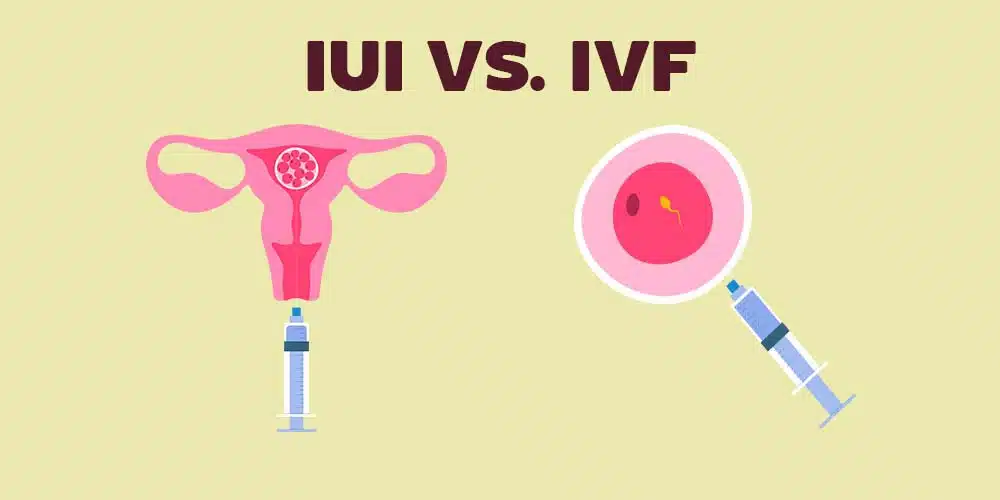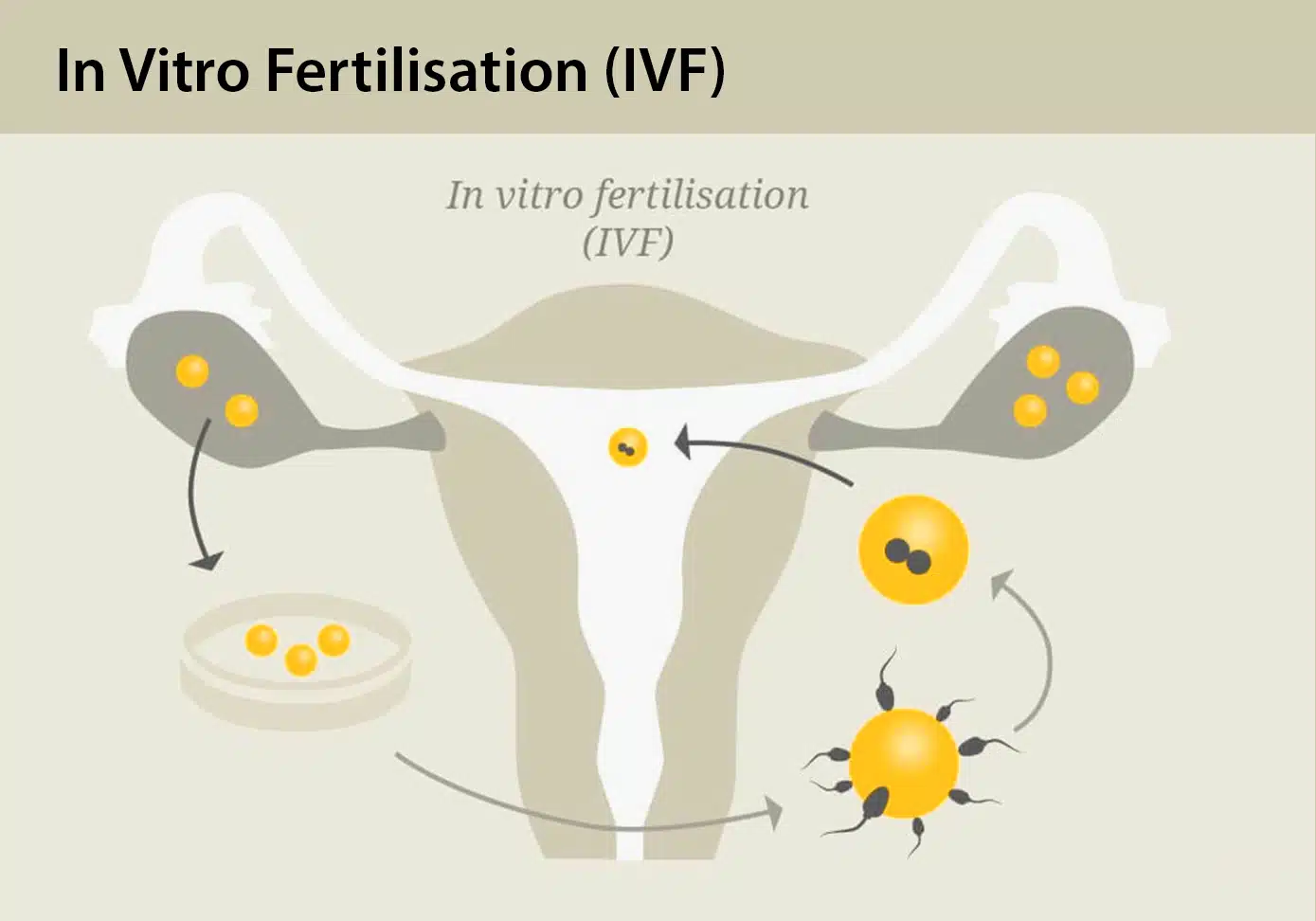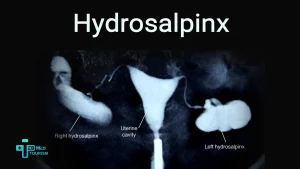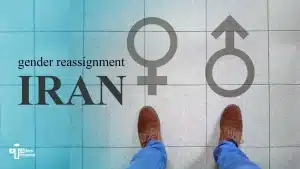Having a baby can be difficult for certain couples, prompting them to think about fertility treatments such as intrauterine insemination (IUI) and in-vitro fertilization (IVF). Couples who are dealing with fertility problems should seek advice from a specialist who will assess test results and suggest appropriate treatments, along with estimated success rates. Maybe this issue has been weighing on your mind, deciding between IUI and IVF, how to choose between IUI and IVF? By reading this context all of your question in this field will be solved! It’s crucial to comprehend the distinctions between IUI and IVF in order to make an informed decision. IUI involves placing sperm directly into the uterus, whereas IVF is a multi-step procedure that includes egg stimulation, egg retrieval, fertilization in a lab, and then transferring the embryos into the body. If you want to know more about topics, which written below, be with us:
- Differences between IVF and IUI
- IUI vs IVF process
- IUI vs IVF success rate
- IUI vs IVF cost
- Chance of multiple, IUI vs IVF?
- Is IUI right for me?
Differences between IVF and IUI
In this part of article, we are going to make comparison between IVF and IUI. So, lets go further and know about them:
What is IVF (In Vitro Fertilization)?
IVF is a popular and successful method of fertility treatment when other methods like IUI fail repeatedly. It involves using fertility drugs to stimulate the ovaries and produce multiple mature eggs. These eggs are then retrieved and fertilized with sperm in a lab. The resulting embryos are transferred to the uterus, where they may attach to the uterine wall and result in a pregnancy.
What is IUI (Intrauterine Insemination)?
IUI, also known as “artificial insemination,” is a non-surgical procedure conducted on an outpatient basis. In this procedure, a doctor inserts sperm from a male partner or a sperm donor directly into the uterus of a female patient. IUI improves the chances of pregnancy by providing a head start to the sperm and ensuring that insemination occurs during ovulation. However, compared to IVF, IUI is less effective, less invasive, and less expensive. For many patients, IUI is typically the initial step in their fertility treatment journey. It can be a suitable choice for individuals dealing with conditions such as Poly Cystic Ovarian Syndrome (PCOS), anovulation, cervical mucus issues, or problems with sperm health. IUI is also a viable option for same-sex couples, single mothers by choice, and individuals experiencing unexplained infertility.
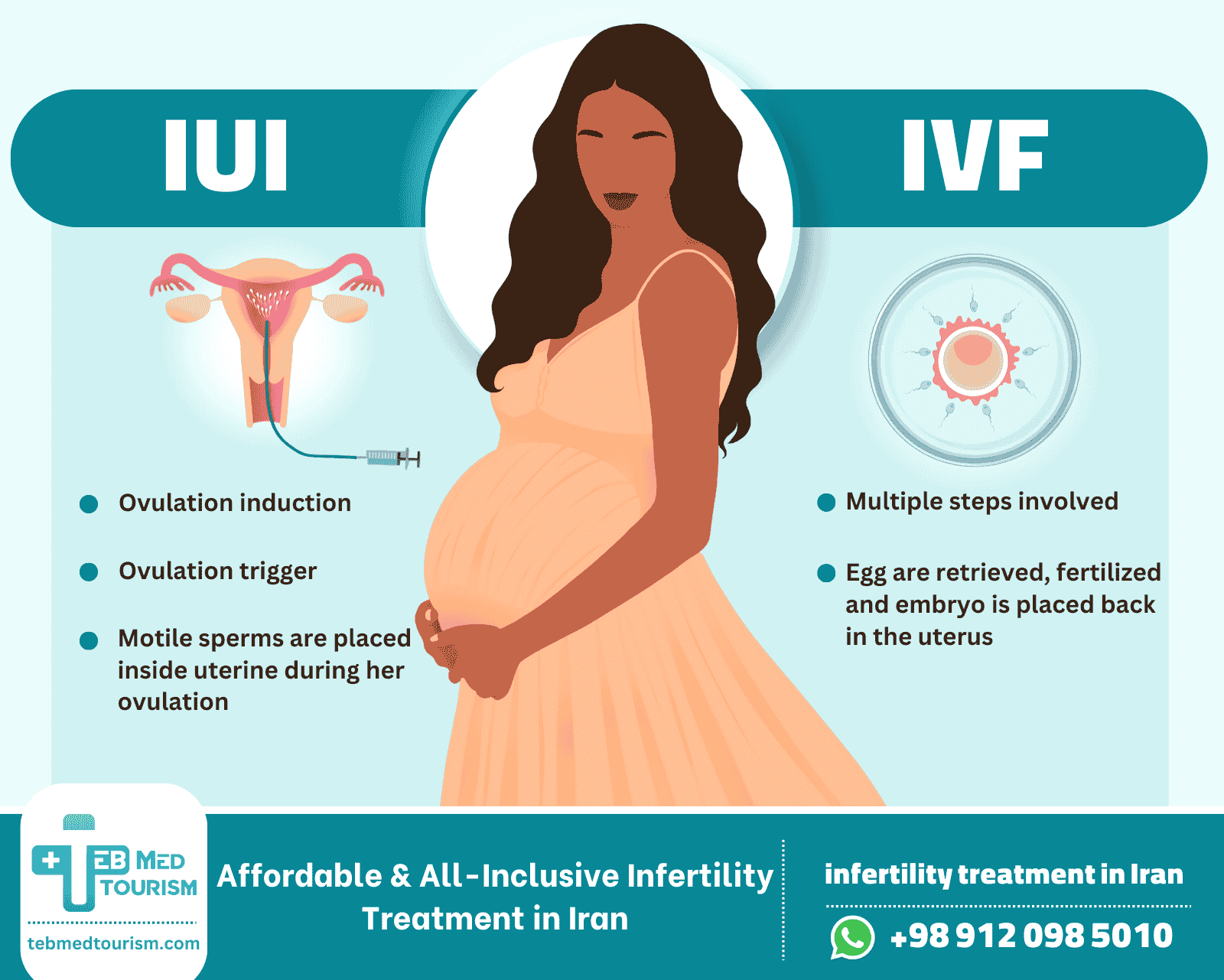
IUI vs IVF process
Both IVF and IUI procedure may take about two weeks but there are some differences between them.
IVF procedure
The success of IVF mainly relies on the ability to fertilize a larger number of eggs. To achieve this, female patients are typically given injectable medications to stimulate the ovaries and produce multiple eggs in one cycle. The effectiveness of the medication is regularly monitored through ultrasound and blood tests over a period of 8 to 12 days. Once the eggs reach maturity, they are retrieved from the patient’s ovaries through a short surgical procedure done under sedation. At the same time, the male partner provides a semen sample. The eggs and sperm are then combined in a laboratory and monitored by an embryologist for about five days. The resulting embryos that develop and survive can either be immediately transferred to the uterus for a chance at conception or frozen for future attempts at pregnancy. Furthermore, IVF can combine with ICSI procedure, and also gender selection, which we have written some articles about them.
IUI procedure
In an IUI cycle, the process begins with the start of your menstrual period, similar to other fertility procedures. Your physician will monitor your menstrual cycle for about 12 to 14 days using blood tests and ultrasound scans. They ensure that an egg matures correctly in preparation for ovulation. Ovulation is when a fully developed egg is released from the ovary and travels through the fallopian tubes, potentially leading to pregnancy if fertilized. During this monitoring process, the IUI procedure takes place on or around the day of ovulation, either just before or just after. The first step of IUI involves the male partner or a sperm donor providing a semen sample. This sample goes through a “washing” process to separate healthy sperm from the rest of the fluid. This increases the chances of fertilization. The prepared sperm sample is then introduced into the uterus using a thin catheter, allowing natural fertilization to occur, similar to a regular menstrual cycle. Sperm swim towards the egg, ideally successfully fertilizing it. Sometimes IUI cycles are conducted without medication. This approach is suitable for individuals or couples using donor sperm and without any fertility issues, or for heterosexual couples where the female partner doesn’t experience ovulation difficulties. An unmedicated cycle requires less monitoring but may have lower effectiveness. Based on your diagnosis, your doctor may recommend an IUI cycle with medication to induce ovulation. This method is often used for women who have trouble ovulating naturally, such as those with PCOS, or for those who want to increase their chances of conceiving in a single cycle. Medication options for an IUI cycle can include oral medications like Clomid or letrozole, or injectable hormone medications (gonadotropins) typically used in IVF treatments.
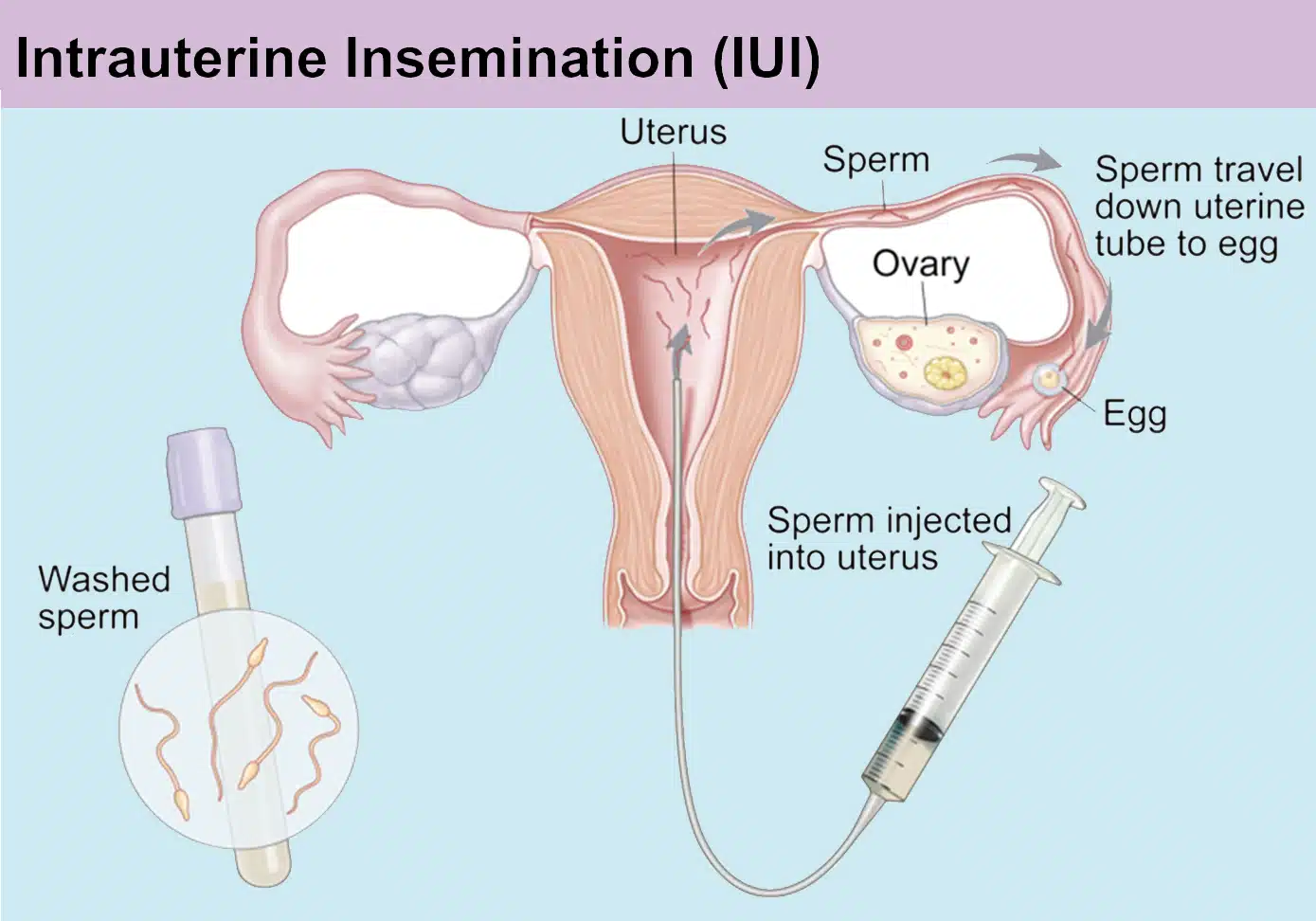
IUI vs IVF success rate
Remember that infertility treatment does not guarantee pregnancy, but it does increase your chances of getting pregnant. Although IVF technically has a higher success rate than IUI, it is not as simple as it seems. Your personal success rate depends on your body’s unique characteristics, so relying solely on raw data and percentages is not always beneficial.
IVF success rate
The likelihood of IVF being successful is influenced by various factors, including age, ovarian reserve, the cause of infertility, past successful pregnancies, quality of facilities, and clinic experiences. In general, a majority of patients can anticipate a success rate ranging from up to 75% with TebMedTourism.
IUI success rate
For all types of patients, the live birth rates per IUI cycle generally fall within the range of 5% to 15%. However, reported success rates can differ significantly across studies. In certain studies, the success rate, when fertility drugs are used in conjunction with IUI, is as low as 8%.
IUI vs IVF cost
The cost of IVF and IUI might be variable and depends on your destination, quality of procedure, experience of clinic, etc. We analyzed cost of IVF in our latest article, cheapest country for IVF, so, here we will talk about the cost of IUI and IVF in Iran. Although, the average cost of IUI is generally about 3200 $, cost of IUI in Iran is 500-600 $ by TebMedTourism. This low price beside high quality fertility experts and equipment, make this clinic one of the most popular destinations for everyone who want to be parent! The cost of IVF in Iran, is just 3500 $ with all medical process including medication, injection, embryo transfer, etc.

IUI vs IVF, which one is right for me?
To determine whether IUI or IVF is the appropriate option for you, it’s advisable to seek guidance from a fertility doctor. While you may have your own sense of what’s best for you, doctors can offer expert recommendations based on factors such as your age, overall health, and the underlying cause of your infertility. Generally, younger couples tend to have higher success rates with IUI, making them favorable candidates for this procedure. However, if fertilization doesn’t occur and multiple rounds of IUI are required, the costs can accumulate. It’s important, therefore, to carefully consider the expenses, benefits, and risks associated with both IUI and IVF before making a decision. Actually, if you want to decide between IVF and IUI, considering that the success rate of IVF is higher and it is also a more accurate and correct solution for treating infertility, it is preferable to use IVF, but in some cases, the best solution for you may be IU, which is done with consultation. Medicine can find out about this. You may want to do free consultation, with our fertility specialist to know which one is better for you! So, ask your question.
Chance of twins, IVF vs IUI?
It’s challenging to provide precise percentages for the chances of having twins with IVF or IUI because the likelihood of twins varies greatly depending on individual factors such as age, number of embryos transferred (for IVF), and the use of fertility medications. However, I can give you some general information:
Chance of twins by IVF:
– The probability of having twins with IVF can range from approximately 20% to 40% or even higher, depending on the number of embryos transferred. – When only one embryo is transferred, the chance of twins is lower, usually around 1% to 5%. However, multiple embryos are frequently transferred to increase the chances of success, which can result in a higher likelihood of twins or more.
Chance of twins by IUI:
– The likelihood of twins with IUI is generally lower than with IVF because it relies on natural fertilization. – Without the use of fertility medications, the chance of having twins with IUI is relatively low, typically around 5% or less. – If fertility medications are used to stimulate egg production and increase the likelihood of releasing multiple eggs, the chances of twins may increase up to 30%, but this still varies based on individual factors.
Frequently Asked Questions about IUI vs IVF
Is it better to start with IUI or IVF?
It is advisable to consult a fertility specialist to determine the most suitable option based on individual circumstances. Generally, IUI may be recommended for younger couples with fewer fertility issues due to its lower invasiveness and cost. However, if multiple attempts of IUI are unsuccessful or if more complex factors are involved, IVF may be the suggested course of action.
which is more painful IUI or IVF?
Neither IUI nor IVF typically entail significant discomfort. Both procedures may cause mild discomfort, but this can be effectively managed with available pain relief options. Any discomfort experienced during these procedures is usually of short duration and minimal in intensity.
Which is more effective IUI or IVF?
IVF generally exhibits a higher overall success rate compared to IUI. The success rates of both treatments can vary significantly depending on individual circumstances, but IVF offers a greater likelihood of success due to its more controlled steps, including laboratory fertilization.
What is difference between IVF and IUI?
IVF is a more intricate fertility treatment that involves ovarian stimulation, retrieval of eggs, laboratory fertilization, and subsequent embryo transfer. On the other hand, IUI is a less invasive procedure where sperm is directly placed into the uterus. While IVF tends to be more effective, it is also more expensive and invasive compared to IUI.
which is more painful IUI or ivf?
Both IUI and IVF generally involve minimal pain. Any discomfort experienced during these procedures is typically mild and short-lived. Pain perception can vary among individuals, but neither IUI nor IVF is commonly associated with significant pain.







